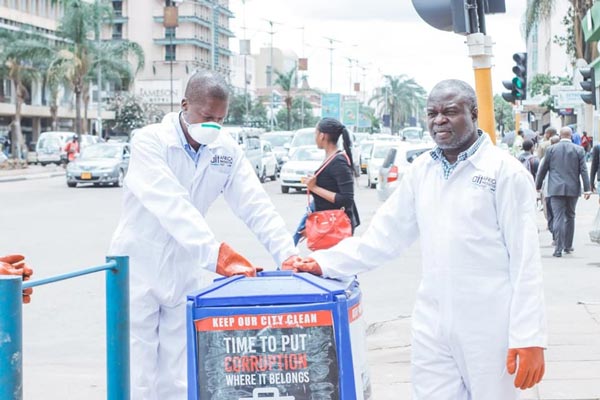

Environment By Moses Mugugunyeki
In the late 1980s, Zimbabwe was rocked by the Willowvale car scandal, which has turned out to be one of the worst corruption scams ever to be experienced in the country.
There have been several corruption scandals that shocked Zimbabwe since independence and these included the Paweni scandal, which was swept under the carpet although it implicated the late former minister Kumbirai Kangai, the Ziscosteel Blast Furnace Number 4 scam of 1987, War Victims Compensation Fund scandal (1994) and Harare Airport scandal (2001), among others.
Over the years, corruption has become like a cancer growth that has been eating away at the fabric of society and economic growth. Decadence and personal enrichment have become the order of the day in the corridors of power weakening the prestige of the government.
Zimbabwe is the 160 least corrupt nation out of 175 countries, according to the 2018 Corruption Perceptions Index compiled by Transparency International.
Corruption Rank in Zimbabwe averaged 123,48 from 1998 until 2018, reaching an all-time high of 166 in 2008 and a record low of 43 in 1998.
It is against such a backdrop that the government established the Zimbabwe Anti-Corruption Commission (Zacc) after the passing of the Anti-Corruption Commission Bill in June 2004. The commission is a signatory to the Southern Africa Development Community (SADC) Protocol as well as the African Union Commission and United Nations Convention on Anti-Corruption.
However, according to a 2009 report by Global Integrity, Zacc is highly inefficient and “has very little authority to take steps aimed at stopping corruption in Zimbabwe”.
- Chamisa under fire over US$120K donation
- Mavhunga puts DeMbare into Chibuku quarterfinals
- Pension funds bet on Cabora Bassa oilfields
- Councils defy govt fire tender directive
Keep Reading
Just recently President Emmerson Mnangagwa disbanded Zacc amid claims that it had become a white elephant, with some of the members allegedly involved in corrupt activities, while others were dabbling in factional politics.
There have been delayed administrative decisions caused by the anti-corruption commission, which has been a major concern as it shrouded a cloud of uncertainty in the society.
It seems nothing is being done to end corruption as campaigns against graft at all levels of society have come and go. Nobody seems to be pursuing matters so thoroughly and comprehensively and efforts by those mandated to do so have hit a brick wall.
A local non-governmental organisation, Africa Innovation Trust (AIT), which was founded on the premise of growing the technology edge in a mainstream way of life, believes engaging society at the rudimentary level was a panacea to the corruption scourge in Zimbabwe.
AIT is running a corruption awareness campaign, which involves a clean-up campaign dubbed “Corruption Pfee Mubin”.
On Wednesday, concerned citizens which included City of Harare and government officials converged at Karigamombe Centre for a clean-up exercise meant to raise awareness on corruption.
“This is going to be a weekly exercise where we invite concerned citizens to take part as we try to send the anti-corruption message home,” said AIT lead resource Benjamin Nyandoro.
Our message is that, when you throw litter in a bin you are as well getting rid of corruption. Corruption is dirty and it should be thrown in a bin.”
Harare councillor for Ward 6 Charles Joshua Nyatsuro said clean-up campaigns were one way of raising awareness among citizens.
“Clean-up exercises are one of the best strategies of raising awareness, particularly here in Harare where the council is facing waste management challenges,” said Nyatsuro.
“I am happy that I was one of the citizens that gathered in Harare on Wednesday for a unique clean-up exercise that is meant to raise awareness on fighting corruption. The message is clear that corruption is dirty and should be thrown in the bin. We want to operate in a clean environment that is litter free and has zero corruption.
“To citizens let’s all take part in such initiatives like the ‘Corruption Pfee Mubin’ so that we help raise awareness and tackle corruption together.”
The “Corruption Pfee Mubin” concept runs in tandem with AIT’s technological product ICU ‘I See You’, meant to fight corruption.
“AIT delivers tools and platforms that allow the public to report on corruption,” Nyandoro said.
“The mobile application ICU ‘I See You’ on Android, iOS, and Windows devices, downloaded ‘free’, allows the public to report via [text, image, audio and video] on corruption.
“ICU responds to the bulk of the concerns often raised around reporting cases of corruption. Among the concerns are quality of evidence and safety of whistle blowers.”
Nyandoro said technological innovation has the potential to tackle key issues in society, including corruption.
“By utilising advancements in technology, we are joining hands with the government and other organisations that are using other means to tackle the scourge in an effective manner,” he said.











